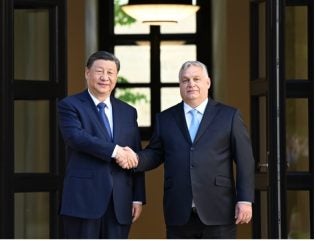
During Chinese President Xi Jinping’s recent visit to Hungary – the third stop in his five-day visit to Europe after France and Serbia – a memorandum of understanding on the peaceful uses of nuclear energy was signed by the China Atomic Energy Authority and Hungary’s Ministry of Foreign Affairs. It was one of 18 agreements covering a range of subjects.
The joint statement on the establishing of an All-Weather Comprehensive Strategic Partnership for the New Era, noted: “The Chinese side will continue to encourage capable Chinese enterprises to invest in Hungary. The two sides will promote orderly cooperation in emerging fields including clean energy, artificial intelligence, mobile communication technology and nuclear energy and technology.”
Following talks with President Xi, Hungary’s President Viktor Orban said Hungary had serious ambitions. “The previous 100 years, the 20th Century, was a shameful one for Hungary. It was a century in which we lost, a century in which we suffered extremely heavy losses of historic proportions. And the concept driving the Hungarians is that we want to win the 21st Century, and not lose it. And to win we need partners, investors, trading partners and the world’s most advanced technology.”
He added: “I will make special mention of something which is not only an economic fact, but also an expression of confidence: the fact that we can extend our cooperation to the whole spectrum of the nuclear industry, where up until now there has been no cooperation between our two countries. This holds great potential, because in this respect – in terms of the nuclear industry – Hungary has considerable international experience and prestige, as we have been involved in this industry for more than 50 years, and currently the largest nuclear development in Europe is taking place in Hungary. Our plan is that by the beginning of the next decade the share of Hungary’s energy provided by nuclear power will be between 60 and 70%.”
Hungary’s Foreign Affair &Trade Minister Peter Szijjártó said the talks between Xi and Orbán had been “extremely successful”. He said the two sides expanded an earlier a list of joint projects under the Belt and Road initiative aimed at developing East-West connections. “We have now agreed with the Chinese government on drafting a cooperation agreement covering the length and breadth of the nuclear industry to ensure both countries’ access to the cheapest, safest, most efficient way of producing electricity,” he noted. Demand for electricity will increase sharply the world over, he said, adding that nuclear energy best met such demand.
Szijjártó said the new all-weather comprehensive strategic partnership for the new era was an honour for Hungary. “I think it reflects the rightfulness of our China policy. We are among those countries in Europe, which consider the cooperation with China as an opportunity and not as a risk,” he said, adding that Hungary rejects de-risking, decoupling and all kinds of such approaches.


